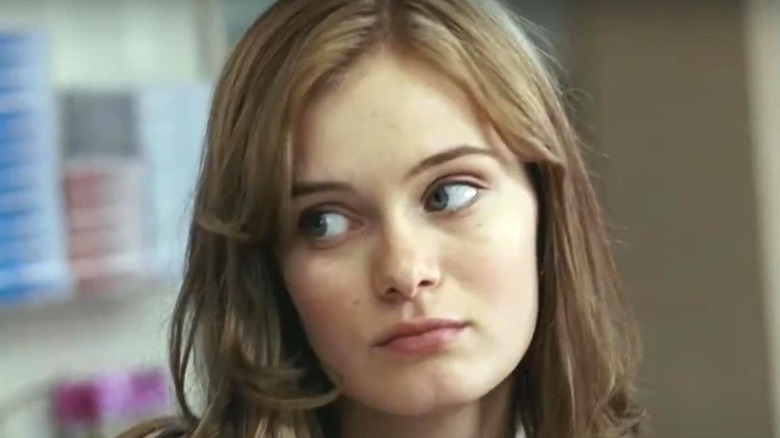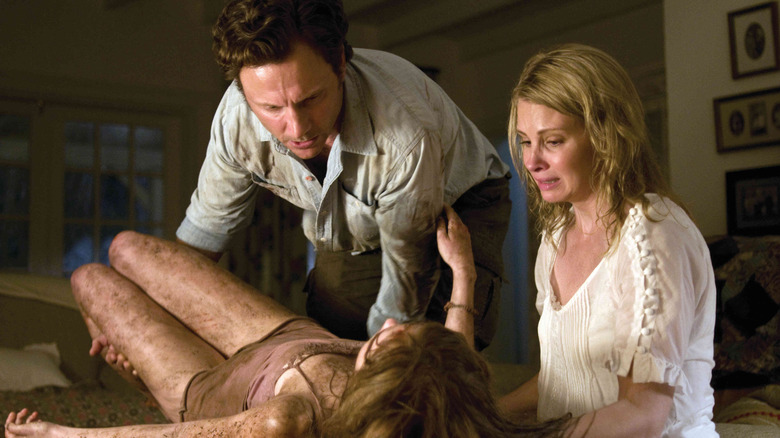The Ending Of The Last House On The Left Explained
Of the trio of Wes Craven remakes that surfaced in the 2000s, Dennis Iliadis' "The Last House on the Left" (2009) was arguably the most divisive among audiences and critics, and certainly the most controversial in its departure from the original.
Few would dispute Wes Craven's title as a master of cinematic horror, but things were very different almost fifty years ago when he released his directorial debut, "The Last House on the Left." This bleak and nihilistic revenge horror caused quite a shock with its heady cocktail of graphic violence, sexual torture, and abuse juxtaposed with jarring moments of black comedy — all backed by a sensationalistic promotional campaign. The film depicts the tragic and gruesome ends met by teens Mari Collingwood and Phyllis Stone, and the aftermath as Mari's parents take bloody revenge on those responsible for killing the girls.
The 2009 remake of "The Last House on the Left" was directed by Dennis Iliadis and produced by Wes Craven himself under his Midnight Pictures production company label. For the most part, the remake — starring Tony Goldwyn, Monica Potter, Garret Dillahunt, Sara Paxton, and Martha MacIsaac — remains faithful to the plot and tone of the original. Mari (Paxton) and her friend Paige (MacIsaac) are kidnapped, sexually assaulted, tortured, and left for dead by Krug (Dillahunt) and his gang. When Krug's gang unwittingly takes refuge in the titular house, Mari's parents John (Goldwyn) and Emma (Potter) discover what was done to their daughter and wreak equally brutal vengeance.
Many aspects of Iliadis' remake provoked a mixture of outrage and praise from critics, including its fusion of savage brutality with slick production values. But it was the ending of "The Last House on the Left," with its major departure from Craven's original vision, that really divided everyone who watched the film.
Mari's survival gives the Last House on the Left a 'happy' ending
By the end of Craven's 1972 original, both Mari and Phyllis have been ruthlessly tortured and slaughtered. The last we see of Mari, she stumbles into the lake and is fatally shot in the back by Krug. When Mari's parents discover her body in the lake, their revenge on the gang includes throat slitting, exsanguination by the amputation of a certain appendage, and a finale in which Mari's father chainsaws Krug to death in front of the newly-arrived sheriff.
The major departure in the 2009 remake comes in its ending, when we discover that Mari survived being shot and left for dead in the lake, and has made her way back home. Mari's parents find her on the porch and proceed to take revenge on her attackers in brutal and gory ways that would have likely satisfied Craven, and the surviving family boats across the lake to take Mari to a hospital.
In Craven's utterly bleak original, everybody dies except Mari's parents, who are now faced with the rather harsh comedown from a joyous, blood-soaked orgy of violence not-so-far-removed from the one they are purportedly punishing. Even the wholesome, innocent Collingwoods are capable of such atrocities under the right circumstances. The audience experiences the same comedown, having been implicated to some degree by simply having watched the unfolding scenes.
By having the Collingwood family survive intact and sail into the sunset, does the remake justify their revenge with a resolution far less transgressive than the original? In an article for Inquirer, Tirdad Derakhshani certainly seems to think so. "Iliadis' slick movie gives the parents and the audience a pass: There's no bitter aftertaste or hangover for us as we rejoice in the revenge wrought on the bad guys (and gal)," they wrote. "The good guys win — and they save their young."
Derakhshani continued, "We are led to believe that Mari's parents are justified ... and that it is an inviolable right to exact revenge." They're not wrong, and perhaps it's this adjustment in the remake that garnered so much fierce division among the original's fans.

